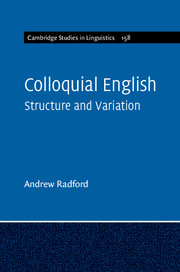3 - Complementisers
Published online by Cambridge University Press: 09 June 2018
Summary
Introduction
This chapter looks at aspects of the syntax of complementisers, and more specifically at how a range of different peripheral heads come to be spelled out as the complementiser that in indicative clauses in colloquial English. I will not look at subjunctive that for the simple reason that my broadcast English data contain too few examples to draw any firm conclusions about its use (which is scarcely surprising, given that its use is largely restricted to formal registers of written English).
Typical structures in which descriptive and pedagogical grammars of English claim that the indicative complementiser that is and isn't used in standard varieties of English are illustrated below:
(1) a. (*That) he can't stand garlic)
b. I suspect [*(that) garlic, he can't stand (it)]
c. *He says [garlic, that he can't stand (it)]
d. I wonder [why (*that) he doesn't like garlic]
e. (You'd never believe) [how much (*that) he hates garlic!]
f. Garlic is something [(*which) that he can't stand]
g. He doesn't like gazpacho [because (*that) he can't stand garlic]
The contrast between (1a) and (1b) suggests that indicative that can only be used in a subordinate clause like that bracketed in (1b), not in a main clause like (1a); moreover, as (1b) illustrates, that is obligatory in complement clauses when followed by a peripheral constituent. The ungrammaticality of (1c) suggests that has to be the first overt constituent in its clause: this same requirement will also rule out clauses like those bracketed in (1d–g), in cases where that is preceded by an (interrogative, exclamative or relative) whconstituent, or by a subordinating conjunction. Thus, the overall picture painted by sentences like (1) is that (in canonical uses in standard varieties of English), indicative that is a subordinate, declarative, clause-initial complementiser.
However, this characterisation is based on the (sometimes disputed) introspective grammaticality judgements of linguists rather than recorded samples of spoken English. Although there is some experimental evidence suggesting that introspective judgements of experienced linguists can be relatively robust (Sprouse & Almeida 2011a, 2011b), there is also conflicting experimental evidence (Radford, Felser & Boxell 2012) that the judgements of educated native speakers can unwittingly be influenced by prescriptive education.
- Type
- Chapter
- Information
- Colloquial EnglishStructure and Variation, pp. 105 - 215Publisher: Cambridge University PressPrint publication year: 2018



